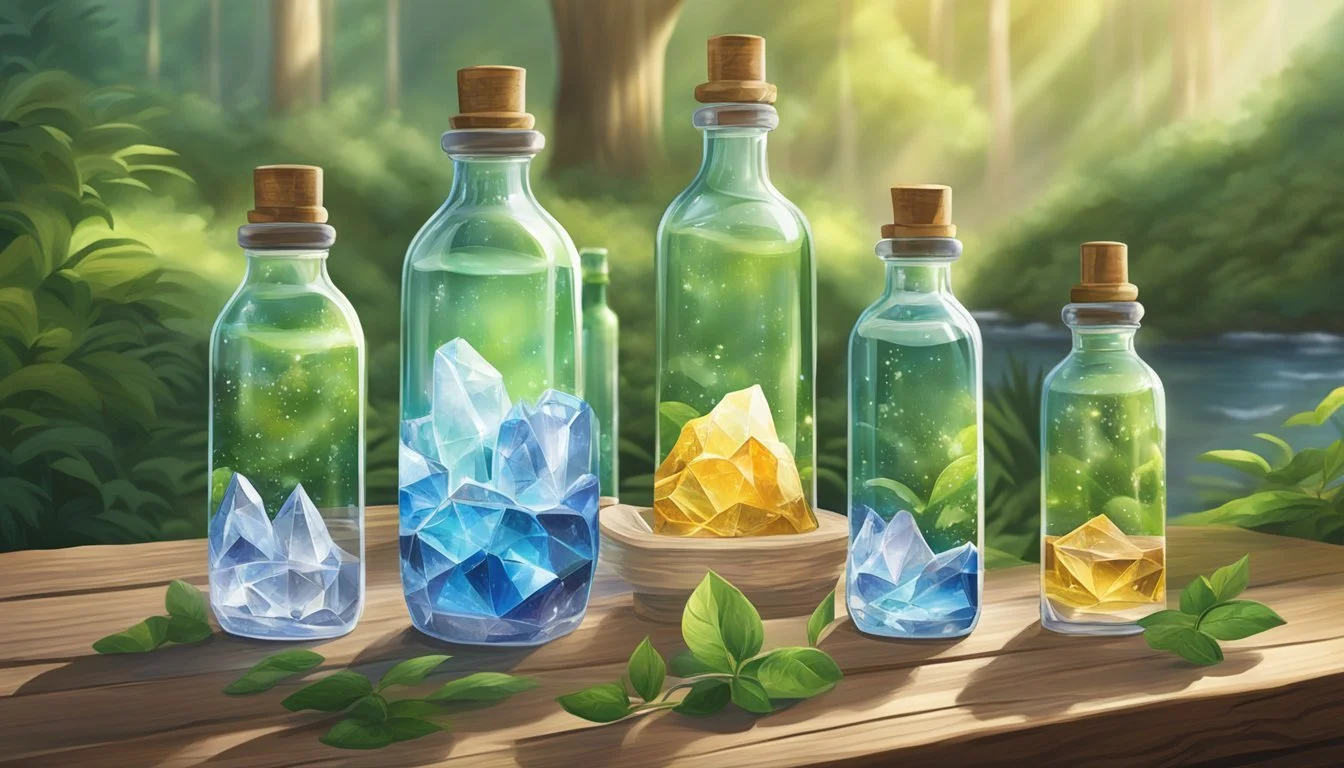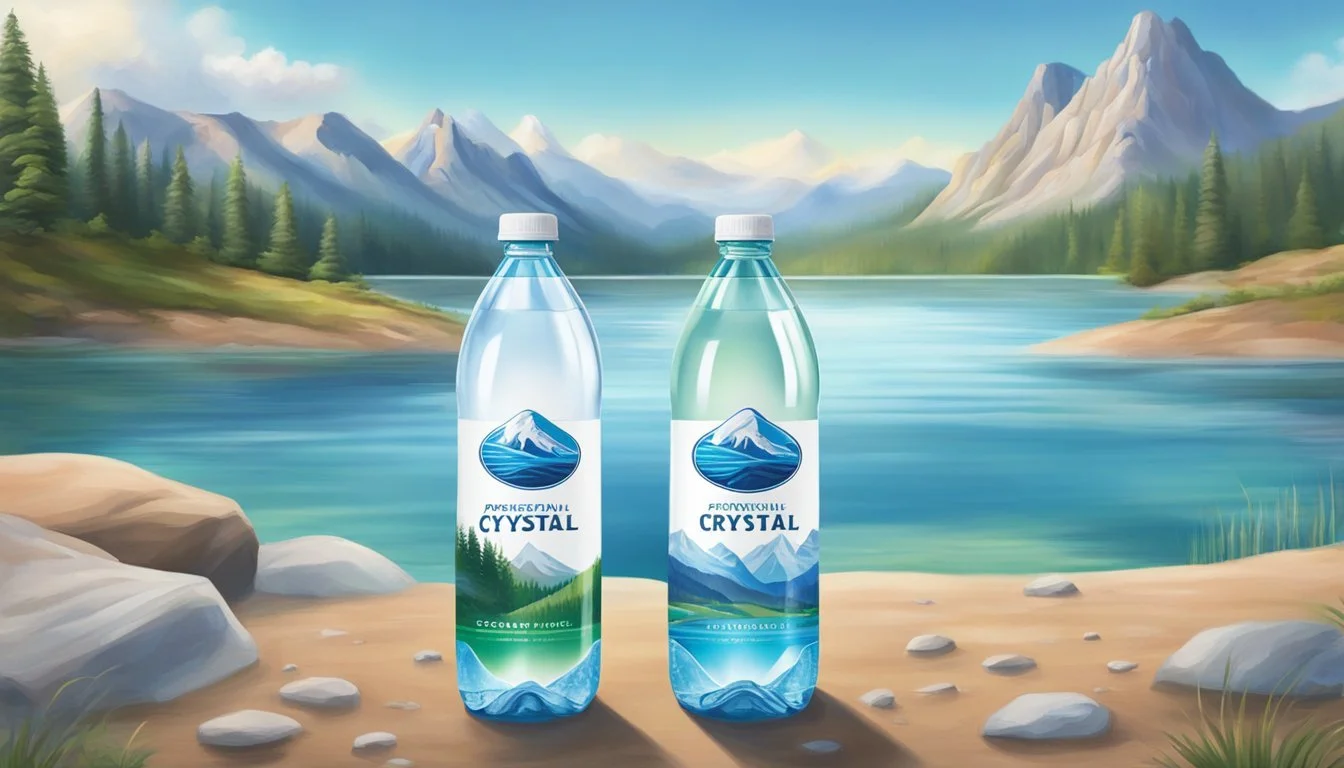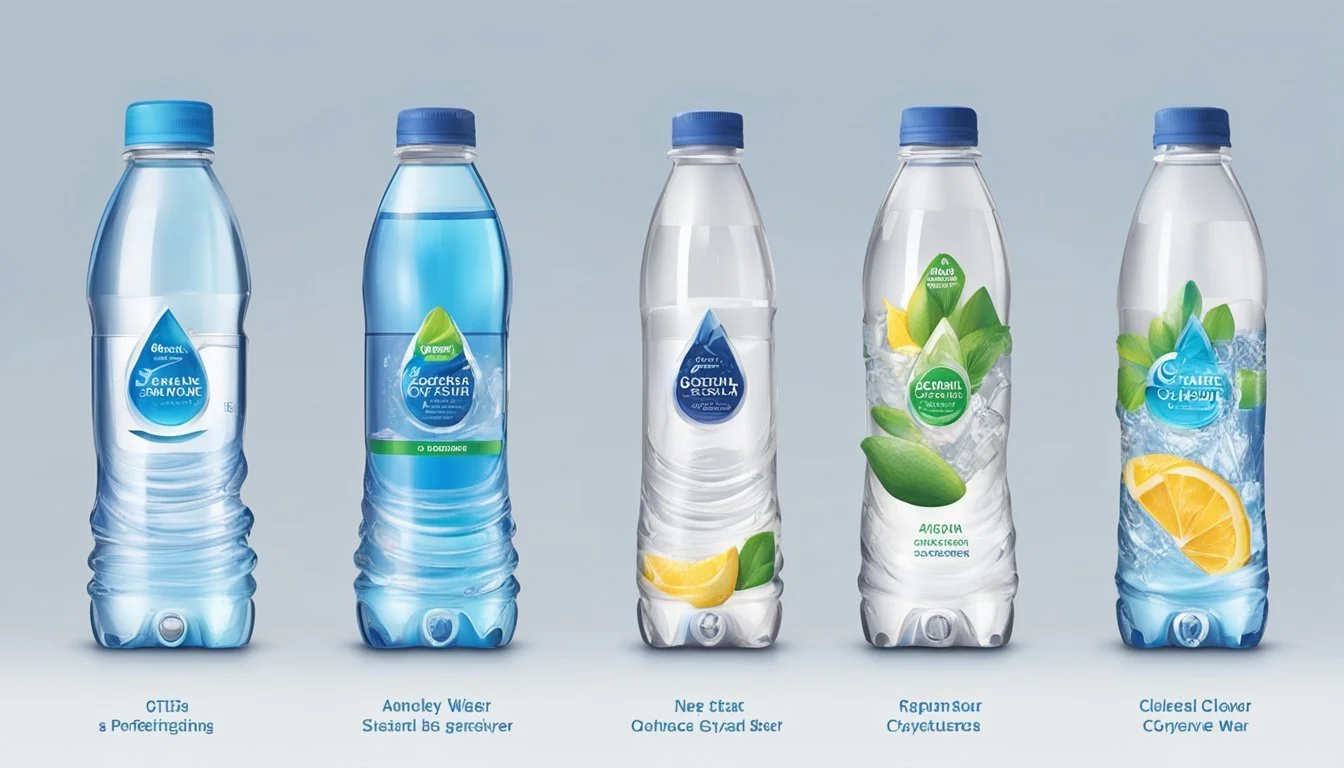Starkey vs. Crystal Geyser
Comparing Quality, Taste, and Value
When it comes to choosing the best bottled water, consumers often find themselves debating between popular brands like Starkey and Crystal Geyser. Between Starkey and Crystal Geyser, Crystal Geyser stands out for its accessibility and affordability while ensuring that it is bottled directly at the source, minimizing the risk of contamination. Starkey, though often praised for its high mineral content and smooth taste, tends to be more expensive.
Water brands such as Crystal Geyser emphasize their "bottled at the source" claims, providing a sense of purity and natural taste that appeals to many consumers. Crystal Geyser's commitment to not blending, trucking, or purifying from tap sources has solidified its reputation among health-conscious individuals. Starkey, on the other hand, boasts a unique volcanic aquifer origin, which accounts for its distinct mineral profile and premium pricing.
Evaluating the pros and cons of each brand can help determine which bottled water better meets your preferences. While Starkey's higher price may be a sticking point for some, its unique source and quality are appealing. Crystal Geyser offers a balance of quality and cost-efficiency, making it a favorite among budget-conscious consumers who do not want to compromise on purity.
Overview of Starkey and Crystal Geyser
This section provides an overview of Starkey and Crystal Geyser bottled waters, focusing on their histories, brand profiles, and the variety of products they offer.
History and Brand Profile
Starkey: Starkey, a brand under the Whole Foods Market umbrella, is known for its natural spring water sourced from Idaho's Starkey Hot Springs. The water is filtered through volcanic rock, which gives it a unique mineral composition.
Crystal Geyser: Crystal Geyser Alpine Spring Water is owned by CG Roxane. Established in 1990, the brand prides itself on bottling water at the source. Its water comes from multiple protected springs across the United States, ensuring a fresh supply.
Product Range and Varieties
Starkey: Starkey offers primarily natural spring water. It is available in various sizes, including 1-liter glass bottles, which appeal to eco-conscious consumers. Starkey emphasizes its high-quality and mineral-rich composition, making it a favored choice for those seeking premium bottled water with distinct taste profiles.
Crystal Geyser: Crystal Geyser provides a broader product range. Their portfolio includes sparkling waters and natural spring water. Bottled at several sources, the brand ensures that their water is minimally processed. Packaging options vary from small personal bottles to large gallon jugs, catering to different consumer needs.
Both brands are committed to quality and source protection. They provide distinct choices for consumers, whether seeking premium mineral content or a variety of packaging options. Starkey focuses on purity and minimalism, while Crystal Geyser offers more variety and is recognized for its convenient availability and consistent quality.
Source and Sustainability
This section covers where Starkey and Crystal Geyser source their water, the environmental impacts of their bottling processes, and their sustainable practices and initiatives.
Water Source Comparison
Starkey: Starkey sources its water from a geothermal spring located in Idaho. This source is touted for its natural purity and mineral-rich content, offering a unique taste profile. The geothermal origins mean that the water is naturally filtered through volcanic rock, which is claimed to add essential minerals.
Crystal Geyser: Crystal Geyser Alpine Spring Water emphasizes its "bottled at the source" principle. Its water is sourced from several natural springs in the United States, including locations in California and Washington. Each source is selected for its high purity and mineral content, ensuring consistency in quality.
Environmental Impacts
Starkey: The bottling of Starkey's water has faced scrutiny, particularly concerning arsenic levels. Environmental impact is also a concern due to transportation from Idaho to bottling facilities and onward to consumers, leading to a significant carbon footprint. The company’s focus on natural spring water might result in regional ecological strain.
Crystal Geyser: Arsenic has also been detected in Crystal Geyser's California facility, although at lower levels compared to Starkey. Transporting water from its multiple natural spring locations to bottling facilities and consumers also contributes to its environmental impact. However, some of its plants use more eco-friendly practices to reduce their carbon footprint.
Sustainable Practices and Initiatives
Starkey: Starkey has made pledges towards more sustainable practices, including the use of recycled materials in its packaging. Efforts to minimize water waste during bottling and more eco-friendly distribution methods are part of its strategy to enhance sustainability.
Crystal Geyser: Crystal Geyser engages in several sustainability initiatives. It champions the use of lightweight, recyclable plastic bottles and has programs aimed at reducing water waste during the extraction and bottling process. These initiatives help to mitigate its environmental impact, making it a better choice for environmentally conscious consumers.
Health and Safety Standards
Evaluating Starkey and Crystal Geyser bottled water involves assessing their compliance with health and safety standards. This includes regulatory adherence, contaminant levels, and the benefits of electrolytes and minerals.
FDA Regulation Compliance
Both Starkey and Crystal Geyser must adhere to the Food and Drug Administration (FDA) standards for bottled water. These regulations set limits on contaminants and ensure safety for consumption.
Compliance involves regular testing for microbiological, physical, and chemical contaminants. The FDA mandates that bottled water meets the federal standards for drinking water, which include limits on arsenic and other heavy metals.
The manufacturers are required to maintain records of testing and address any issues that arise. It is critical for consumer confidence that both brands consistently meet these standards.
Contaminants and Purity
Crystal Geyser has faced scrutiny due to concerns about contaminants. For instance, Consumer Reports found certain levels of arsenic in some bottled water brands, including Crystal Geyser. While the federal limit for arsenic in bottled water is 10 ppb, it is recommended that levels remain below 3 ppb for long-term safety.
Starkey water has also undergone testing for toxic PFAS chemicals. These chemicals can pose health risks if consumed in high quantities over long periods. Both brands must ensure ongoing tests to maintain low contaminant levels, adhering to safety standards to protect public health.
Health Benefits of Electrolytes and Minerals
Both Starkey and Crystal Geyser promote the presence of electrolytes and essential minerals in their water. These substances, including manganese, calcium, and magnesium, are beneficial for bodily functions. Manganese, in trace amounts, is necessary for maintaining health, although excessive levels should be avoided.
Electrolytes aid in hydration and maintaining balance in the body's fluids. Minerals contribute to bone health and overall well-being. Both brands highlight these benefits, although consumers should be aware of the specific mineral composition and concentration in their chosen bottled water.
Ensuring the right balance of electrolytes and minerals can enhance the drinker's health, contributing to the appeal of both brands.
Taste and Quality Analysis
Several factors influence the taste and quality of bottled water, including its source, mineral content, and any treatment processes it undergoes. This section delves into how Starkey and Crystal Geyser fare in terms of these crucial aspects.
Taste Profiles of Starkey and Crystal Geyser
Starkey water offers a mild, slightly alkaline taste due to its high pH level, which is around 8.4. This gives it a smooth mouthfeel, often appreciated by those sensitive to acidic tap water.
Crystal Geyser, on the other hand, has a more neutral pH of approximately 7.2. Its taste is clean and refreshing, appealing to those who prefer a straightforward water flavor without any notable mineral characteristics.
The difference in taste between these two brands can be attributed to their distinct mineral compositions and the sources from which they are derived.
Consumer Reports and Reviews
Consumer Reports highlight the presence of contaminants and microplastics in some bottled waters, which is a concern for both brands. Starkey was noted for having arsenic levels at 8 parts per billion (ppb), which is significant compared to Crystal Geyser's level of around 3.8 ppb.
Consumers have varied experiences with these waters. Reviews often praise Starkey for its smoothness and alkaline properties, whereas Crystal Geyser is lauded for its affordability and consistent taste.
However, the concern over contaminants is a point of contention for both brands, affecting consumer trust and preferences.
Expert Opinions and Water Sommeliers
Water sommeliers and experts bring nuanced insights into the taste profiles of bottled waters. Starkey water is often appreciated for its balanced mineral content and high pH, making it a favorite among alkaline water enthusiasts.
Crystal Geyser, while less mineral-rich, is often recommended for its crisp, pure taste. Experts warn that its slight transport-before-bottling process does not affect its quality significantly.
Overall, while Starkey is favored for its smooth, alkaline qualities, Crystal Geyser wins points for its clean taste and affordability. Both brands face scrutiny regarding their contaminant levels, which remains a crucial factor for expert recommendations.
Comparative Analysis
Starkey and Crystal Geyser are evaluated based on their pH levels, pricing, and market availability. The analysis aims to provide clear insights for consumers choosing between these two bottled water brands.
pH Level Comparison
The pH level of bottled water can impact both taste and health. Starkey, a brand often marketed for its health benefits, typically has a slightly alkaline pH, averaging around 9. This alkalinity can provide a smooth taste and potential health benefits.
Crystal Geyser, sourced from natural springs, generally has a pH of about 7, which is neutral. This neutrality appeals to those who prefer a more natural and unaltered flavor.
Brand pH Level Starkey 9 (Alkaline) Crystal Geyser 7 (Neutral)
Price Point and Value for Money
Price and value are critical when comparing bottled water. Starkey is often positioned as a premium brand, reflecting its higher price point. This premium cost is justified by marketing efforts emphasizing the water's pH balance and source purity.
Crystal Geyser, on the other hand, is more budget-friendly. Despite the lower price, it maintains a reputation for quality and natural sourcing. Consumers seeking better value without compromising on basic quality might lean towards Crystal Geyser.
Market Presence and Availability
Market presence and availability also influence consumer choice. Starkey, although marketed as a premium brand, has a narrower availability range. It's often found in specialty health stores or online.
Crystal Geyser boasts a broader market presence. It is widely available in supermarkets, convenience stores, and online, making it more accessible for everyday consumers. This extensive availability strengthens its market position and consumer recognition.
In summary, each brand offers distinct advantages in pH levels, value, and market presence, enabling consumers to choose based on their specific preferences and needs.
Consumer Preferences and Trends
Consumers have distinct preferences based on demographics and factors such as flavor, packaging, and branding, which significantly influence bottled water choices between Starkey and Crystal Geyser.
Demographics and Consumption Patterns
Different age groups and income levels influence bottled water choices. Young adults often favor eco-friendly packaging and trendy brands. Middle-aged consumers may prioritize health aspects, seeking water with low contaminants. Higher-income families tend to choose premium brands, perceiving them as safer. In contrast, low-income groups focus on affordability, choosing discounted options in bulk.
Geographical location also affects preferences. Urban residents prefer compact, convenient packaging, while consumers in rural areas may look for larger containers to minimize frequent purchases.
Preference Factors: Flavor, Packaging, and Branding
Flavor is a top priority for many. Starkey prides itself on a smooth, mineral-rich taste, whereas Crystal Geyser offers a crisp, refreshing flavor. Flavor additives or enhanced options can sway consumer decisions.
Packaging plays a critical role. Starkey uses sleek, minimalist designs with clear labeling, attracting consumers focused on aesthetics and transparency. Crystal Geyser often utilizes more colorful, robust packaging, appealing to those who associate this with reliability and durability.
Branding greatly influences perception. Starkey's branding emphasizes purity and premium quality, often marketed through pristine imagery. Crystal Geyser focuses on natural spring sources and eco-friendliness, appealing to environmentally conscious buyers. Branding consistency and reputation are key in building consumer trust and loyalty.
Conclusion: The Bottom Line
Starkey and Crystal Geyser offer distinct options for bottled water consumers.
Starkey boasts a pH level closer to neutral, providing a balanced option. However, concerns have been raised about its arsenic levels, cited at 8 ppb, which is below the federal standard but still worth noting.
Crystal Geyser, on the other hand, reports arsenic levels of 3.8 ppb at certain facilities. While lower, it still presents a health consideration for those consuming it over long periods.
For those prioritizing safety and purity, examining the arsenic content in their choices is crucial. Both brands remain popular, but discerning consumers might weigh these factors heavily before making a decision.
Choosing the best water depends on individual preferences and safety priorities. Both Starkey and Crystal Geyser need to continually address concerns to maintain consumer trust.
More About Starkey
Icelandic Glacial vs Starkey: Which Bottled Water is Better?
Mountain Valley Spring Water vs Starkey: Which Bottled Water is Better?
Starkey vs Kirkland Signature: Which Bottled Water is Better?
Starkey vs Richard's Rainwater: Which Bottled Water is Better?
Starkey vs Whole Foods Italian Still Mineral water: Which Bottled Water is Better?
More About Crystal Geyser
Acqua Pana vs Crystal Geyser: Which Bottled Water is Better?
Alkaline88 vs Crystal Geyser: Which Bottled Water is Better?
Aqua Carpatica vs Crystal Geyser: Which Bottled Water is Better?
Boxed Water vs Crystal Geyser: Which Bottled Water is Better?
Cascade Mountain vs Crystal Geyser: Which Bottled Water is Better?
Castle Rock vs Crystal Geyser: Which Bottled Water is Better?
Core Hydration vs Crystal Geyser: Which Bottled Water is Better?
Crystal Geyser vs CBD Living: Which Bottled Water is Better?
Crystal Geyser vs Crystal Lake: Which Bottled Water is Better?
Crystal Geyser vs Essence pH10: Which Bottled Water is Better?
Crystal Geyser vs Kirkland Signature: Which Bottled Water is Better?
Crystal Geyser vs Open Water: Which Bottled Water is Better?
Crystal Geyser vs Proud Source: Which Bottled Water is Better?
Crystal Geyser vs Richard's Rainwater: Which Bottled Water is Better?
Crystal Geyser vs Simple Truth: Which Bottled Water is Better?
Crystal Geyser vs Talking Rain AQA: Which Bottled Water is Better?
Crystal Geyser vs Weird Water: Which Bottled Water is Better?
Crystal Geyser vs Whole Foods 365: Which Bottled Water is Better?
Hawaii Volcanic vs Crystal Geyser: Which Bottled Water is Better?
Hawaiian Springs vs Crystal Geyser: Which Bottled Water is Better?
Ice Mountain vs Crystal Geyser: Which Bottled Water is Better?
Icelandic Glacial vs Crystal Geyser: Which Bottled Water is Better?
Just Water vs Crystal Geyser: Which Bottled Water is Better?
Liquid Death vs Crystal Geyser: Which Bottled Water is Better?
Mountain Valley Spring Water vs Crystal Geyser: Which Bottled Water is Better?
Nestle Pure Life vs Crystal Geyser: Which Bottled Water is Better?
Poland Spring vs Crystal Geyser: Which Bottled Water is Better?
Purely Sedona vs Crystal Geyser: Which Bottled Water is Better?
San Pellegrino vs Crystal Geyser: Which Bottled Water is Better?
Smartwater vs Crystal Geyser: Which Bottled Water is Better?
Solan de Cabras vs Crystal Geyser: Which Bottled Water is Better?
Topo Chico vs Crystal Geyser: Which Bottled Water is Better?
Whole Foods Italian Still Mineral water vs Crystal Geyser: Which Bottled Water is Better?
Zephyrhills vs Crystal Geyser: Which Bottled Water is Better?




